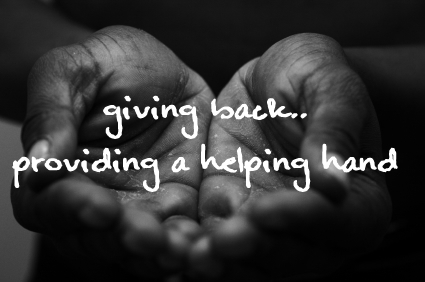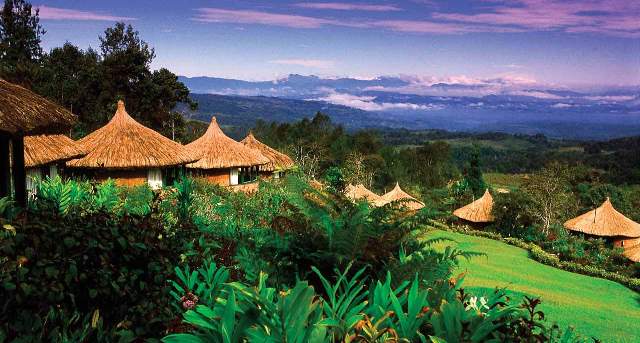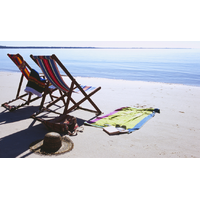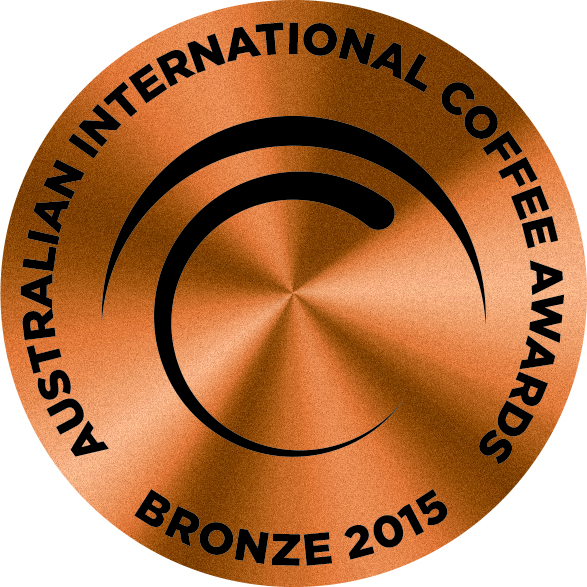March 2015 - PNG Coffees in the balance
Date Posted:1 March 2015
Australia and International Coffee Awards - roasting competition
|
|
BRONZE for our ESPRESSO Espresso Category BRONZE for our SUUWEET Milk-based Espresso |
On 13/3/2015, we were notified of interim results for the Australian International Coffee Awards (AICA) roasting competition - one of the most competitive events held in Australia.
We are pleased to report that our Suuweet and Espresso coffees picked up Bronze Medals in the tough Milk-based and Espresso categories.
Suuweet and Espresso are without doubt our most popular coffees - we produce more than 1000kg of Suuweet and Espresso each week......in fact we roast these coffees 5 nights a week.
It is highly rewarding when our most popular everyday coffees go up against other companies who purchase expensive, competition coffees solely for the purpose of winning medals.

feeling good about giving back
We are often approached to donate our products, time and other value-in-kind to charities and initiatives such as fundraisers. (Please, don't send us more requests to donate - we already deal with at least a dozen requests each week and support more than 10 causes annually).
There is a very rewarding feel-good factor associated with "giving something back" - regardless of the amounts involved.
On top of our selected support of local foundations, something you may not be aware of are the sorts of indirect support provided to organizations in coffee farming nations.
Grounds for Health is an important cause that brings Women's healthcare to coffee growing communities.
Through our key supply chain partner - Bennetts - in December 2014 a donation provided clinical training in pre-cancer screening and treatment to ten(10) healthcare providers in Sidama, Ethiopia.
Over the last few years we have also purchased more than 20 tons of Tiger Mountain raw coffee and a percentage of each 30kg bag purchased is handed over to the 21st Century Tiger Foundation - a worthy conservation cause to save the wild Tigers under threat of worldwide extinction.

Papua New Guinea - so close to home
This month's feature coffee story runs a bit long - it's about a coffee that has been near and dear to my heart for what seems like ages.
Despite the noble attempts of many passionate people to grow and process competitive, consistent, quality coffees in Australia, the fact remains that climatic conditions are pretty much against us.
What you may not be aware of........... our nearest neighbor, Papua New Guinea (PNG) have produced quite remarkable coffees for a very long time.
In my almost 40 years of being "around" coffee, courtesy of my dear Mother having owned coffee-focused cafes since the 1980's, I have respected and at times worshiped the coffees from PNG - it was in fact my very first origin infatuation.
Scott Bennett, a highly respected 3rd generation family coffee broker from the oldest importing company in Australia, once told me that the Australian coffee palate grew up on PNG coffees due to the excellent quality and proximity to Australian customers (roasting companies).
Everything we have become historically conditioned to, in terms of the coffee experience, had largely been combinations of Brazil, PNG and Ethiopia (and the occasional Indian coffee thrown in courtesy of our Italian friends !).
My own love affair with PNG coffees first started in the days when the number of coffee suppliers in Australia could be counted on one hand. The local rep would sometimes drop in a special pack of ground coffee (commercial cafe espresso grinders were not common or available in those days) in plain packaging with some handwritten scribble "PNG" - nothing else to indicate what, where, how or why.
This was different coffee to what my Mother was serving her customers on the monstrous eagle-topped brass + copper espresso machine in her shop. At a time when the term "single origin" was merely just a secret twinkle in the eyes of seasoned coffee roasters, this plain pack was a "gift" from the rep to enjoy, generally offered as amends for a late delivery the previous week.
I would often take this pack for my own private consumption - without ever knowing why I loved this coffee so much more than anything else we had ever tasted. At the time, coffee was...well, just basically coffee.
Fast forward to the early 1990's, working for BHP, I somehow drew the short straw to setup computer systems in PNG. As a young man, strong, supremely fit and literally invincible, I was not adequately warned of the dangers of being in PNG's main towns - or maybe I just did not listen, as was often the case at the time.
A few scary incidents soon after arriving and it did not take me long before I was keeping a very low profile.
PNG was an exciting and intoxicating place - despite all the risks - and I had made quite a few trips in and out over a number of years in the mid 1990's during the era of curfews.
Late one night over drinks with the local General Manager in Rabaul, I waxed lyrically about my love of coffee and how these plain packs scribbled with PNG were something really quite special. The very next day, my friend the GM made a few phone calls and by lunchtime we boarded a small cargo plane for a trip back over the water to Nadzab airport in Lae.
As we could not get an on-flight to Mt Hagan for many days, the next morning we climbed into an old 4WD for a bumpy road trip through some amazing tropical jungle, tiny villages and incredible scenery to Goroka.
Fuel in PNG was not so clean and the vehicles less than well maintained, so a few heat-stopping moments as the 4WD would often randomly splutter to a halt halfway up steep, muddy road only to slide sideways into a ditch.
It took us more than 11hrs of hard-going to travel a mere 300km - apparently, it was not the best time to take this trip with the wet season not quite over and limited road access.
In Goroka, we visited a coffee exporter, wet mill and Co-op. However, what really caught my attention at the time was the faint smell of coffee being roasted somewhere near the town - a hazy smoke drifting slowly in the heavy cloudy air.
We tracked the smell down to this old tin shed with open sides, a leaky roof with the tropical rain falling heavily outside (and almost as much inside). There stood a proud mature PNG man, just over 4 foot tall, next to his rusty, old, noisy wood and coal fired coffee roaster with smoke billowing out everywhere - roasting local coffee - what a photo opportunity.
The next morning we made another hair-raising trip up to Mt Hagan to a couple of large coffee plantations and estates. The scenery around the borders between East and West Provinces rivals anything else I have witnessed around the world - truly spectacular and deserving of a World Heritage listing.
It was at Mt Hagan that I tasted my first wild-grown PNG Highlands coffee and it remains with me today as a key watershed moment in my coffee journey. Did I have my coffee goggles on.......god no, it was truly remarkable coffee.
PNG is blessed with an almost perfect micro-climate for growing coffee. There is no shortage of food as everything grows abundantly - in fact they say you can plant literally anything into the ground and it will flourish.
What sets many PNG coffees apart from other origins is the regal lineage of the varietals grown in the region.
The famous Jamaica Blue Mountain Typica, Tanzanian Bourbon and Arusha's are commonly found in the best lots as are the more modern Kent's originally developed in Kenya and India, planted in PNG estates to be more resilient.
In effect, with PNG coffees you are combining quality DNA with excellent growing conditions.
When a PNG coffee is good, there are few that can match it - complexity, flavour and acid are all exquisitely balanced.
Such was the early profound influence of PNG coffees that when we started our coffee company, PNG raw coffee was a fundamentally essential component for a long time - my #1 priority to secure a superb PNG as this was critical to all our blends.
In my early coffee roasting theory it was something of a target to get the PNG right and presumably everything else would fall into place.
PNG coffees work exceptionally well in milk - the clean acid is a perfect contrast to notes of rich caramel and chocolate and in many respects PNG coffees can be similar to Colombians in terms of the well balanced nature of the cup.
Coffee farming in PNG is quite haphazard - many small farmers, sometimes with just a 100 or so trees sell their cherry to Co-Op's and wet mills for blending into commercial grade export coffees - so there can be wild variations in the cup quality from lot to lot - even when we purchase from the same estate, each pallet can be very different if we spread the sourcing over a few months.
Despite the ideal climate and seed stock, what lets PNG down at times is the lack of incentive, investment and infrastructure - which in turn affects professional conduct when it is time to processing the coffee cherries. In more recent times, the commercial interests of volume and profit have sacrificed quality as the large corporate owners prey on the small farmers and churn out tons to meet order commitments rather then quality.
Unlike other origins where coffee is grown as a critical cash crop to buy food and other supplies, in PNG, coffee is a relatively relaxed affair as there is far more money to be made working for PNG's numerous resource companies - unfortunately, farming of coffee is at times just a hobby or secondary source of modest income compared to the relatively rich lifestyle opportunities offered in mining for gold, copper or oil.
There are areas of PNG where the plantations and estates are large and professionally managed - Carpenter's Sigri/Bannum Wo/Kendang and the Kimel Co-Operative are estates we have been using for more than 7 years.
Over the last few years we have had amazing Peaberry coffees from Kimel and bright, clean cups of Sigri, including organic PNG coffees.
Many large European and US coffee roasters continue to purchase vast quantities of PNG coffees to use in their blends, as do most of Australia's larger coffee companies - due to cup and blend qualities.
A fortnight ago we took delivery of a truly superb lot of PNG Highlands coffee. There is just under 2 tons of this excellent coffee and it will go pretty quickly. An opportunity like this only comes around once a year, or sometimes only every few years.
Supply from PNG can be difficult - there is still just one major road from the Highlands and it gets washed out a few times a year from heavy rains, delaying transit for many weeks at a time. Goods can also get stranded in the ports, so we were very fortunate to secure this coffee without any major issues.
We wanted to feature this coffee in March as it represents, in my opinion, everything that is great about PNG coffees. I fully expect PNG will win new devotees once you try this wonderful lot. Truth is, we have not had a PNG this good for more than 3 years.
We scored this coffee around 86 points - which puts it in the upper echelons of specialty grade and exceptional value for the quality.
Dry aroma of soft hazelnut and plum.
Balanced apricot acidity that is tempered with a full body.
With an exceptional honey sweetness and notes of red apple, milk chocolate, vanilla and caramel.
A complex cup with a memorable finish - perfect as a latte or cappuccino.
PNG Highlands AA - grab is here.......PNG Highlands




